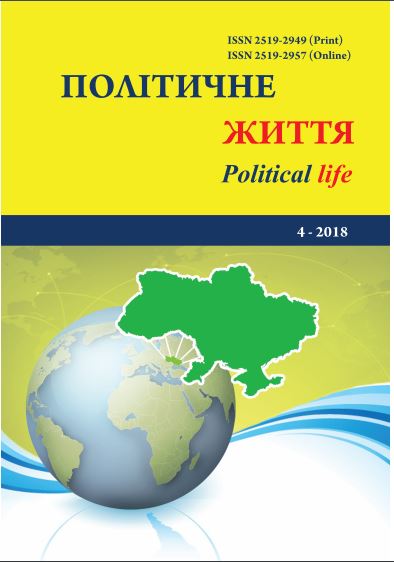Peculiarities of the institutionalization of the elite in the processes of modernization of the political system of Germany (1949-1990).
DOI:
https://doi.org/10.31558/2519-2949.2018.4.8Keywords:
political elite, political system, political modernization, political institute, institutionalizationAbstract
Under conditions of a global development processes of political systems modernization acquire all the more significance, while they contribute to necessary transformations with the aim of adaptation to challenges of environment through making structural meaningful transformations. It actualized the need of research of the subject of modernization activity, which in the process of institutionalization acquires the necessary resources and procedures for its effective implementation.
The processes of institutionalization of the political elite are conditioned by: the strengthening of the professionalization of the political field of activity; the social need for the formation and regulation of the rules of interaction; the need to legitimize the status and procedures of the activity; the presence of structural and functional potential, needed to influence the functioning of the political system. The evaluation of the level of institutionalization of the elite in the processes of modernization of the political system is based on the criteria of adaptability, complexity, autonomy, cohesion, congruency, exclusivity.
The high level of institutionalization of the Germany’s political elite in the processes of modernization allowed to restore the sovereignty of the state, to ensure the appropriate level of democracy, social orientation of socio-political and socio-economic development, consolidating the leading position in world politics. This was facilitated by: 1) the existence of transparent rules of incorporation and intra-elite interaction, their compliance with the Constitution; 3) the use of structural and functional potential and resources for raising standards of public life; 4) the development of the ideas and symbols aimed at consolidating society in order to achieve the strategic goal; 5) initiation of the strategic project of modernization; 6) the sequence of the procedure for the practical implementation and optimization of the project with the help of political technologies. The experience of institutionalization of the political elite of Germany is quiet relevant for Ukraine in the context of modern political reality.
References
Брандт В. Нова східна політика та євроінтеграція. URL: http://history.org.ua/LiberUA/Book/europe/8.pdf (дата звернення: 20.01.2018).
История Германии : в 3 т. / А. М. Бетмакаев, Т. А. Бяликова, Ю. В. Галактионов и др.; отв. ред. Ю. В. Галактионов, сост. науч.-справ, аппарата А. А. Мить. Москва : КДУ, Т. 2: От создания Германской империи до начала XXI века, 2008. 672 с.
Купрій Т. Г. Християнсько-демократичний союз: рання історія та вплив на формування політикоекономічної системи Німеччини : монографія. Київ : НАКККІМ, 2010. 128 с.
Соркин А. Немецкая политика федерального канцлера Аденауера. URL: https://cyberleninka.ru/ article/n/germanskaya-politika-federalnogo-kantslera-adenauera (дата звернення 12.11.2017).
Стрелец М. Гельмут Коль: политический портрет. URL: https://cyberleninka.ru/article/n/gelmut-kolpoliticheskiy-portret (дата звернення 19.11.2017).
Хантингтон С. Политический порядок в меняющихся обществах. Москва : Прогресс-Традиция, 2004. 480 с.
Peters B. G. Institutional Theory: Problems and Prospects. Vienna : Institute for Advanced Studies, 2000. 18 p.

